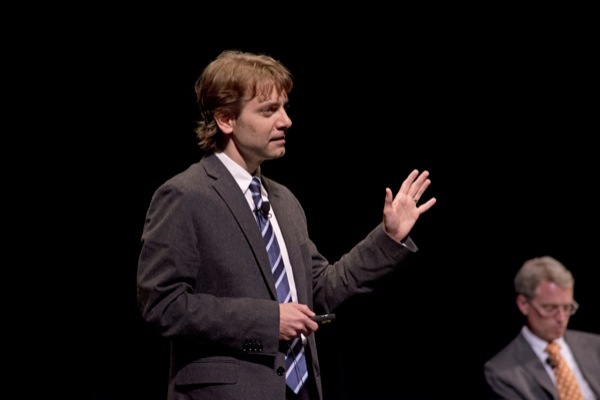Political poll results
National Agenda looks at how Delawareans view state, national politics

9:09 a.m., Nov. 1, 2013–In the aftermath of the recent federal government shutdown, a majority of Americans polled say they want to see more compromise among their elected representatives, but when it comes to issues about which voters have strong feelings, the push for cooperation tends to waver.
Citizen reaction to the shutdown and the way Delawareans view major issues and rate their elected members of Congress were discussed during a University of Delaware National Agenda program held Wednesday, Oct. 30, in Mitchell Hall.
“Delaware and the Nation? also highlighted the findings of a fall 2013 poll conducted by UD’s Center for Political Communication. The poll asked for opinions on issues including same-sex marriage, e-surveillance, voter ID laws and voting rights for felons.
Panelists included Paul Brewer, then acting director of the center and professor of communication, and David C. Wilson, interim associate dean for the social sciences in the College of Arts and Sciences and associate professor of political science and international relations.
Joining UD faculty members on the panel were Sarah Burd-Sharps, co-director of Measure of America with the Social Science Research Council, and Michael Dimock, director of the Pew Research Center for the People and the Press.
Brewer noted that 902 adults in the First State responded to the telephone poll conducted by the UD center from Sept. 3-16.
“There has not been a lot of research or polling that focuses directly on the state of Delaware and what Delawareans think about politics and how they fit into the national view of things,” Brewer said. “Tonight, David Wilson and I are going to talk about the results of this new poll on what Delawareans think on key political issues in the state.”
(For poll results, click here.)
About 43 percent of respondents indicated that they somewhat closely follow political figures and events in Washington, D.C., while 44 percent said they closely follow political figures and events in Delaware with similar intensity.
That majority of respondents, 45 percent, said they get their news about political figures and events in Delaware from television, with 30 percent citing the Internet and 28 percent crediting newspapers as their sources of information.
“We asked them what the felt were the most important problems facing Delaware today,” Brewer said. “Leading the list was jobs and unemployment, at 29 percent, followed by education and school funding, at 11 percent, and the economy, at 10 percent.
Brewer said the poll also asked Delawareans to rate three national politicians and three local politicians.
President Barack Obama received a combined very favorable and mostly favorable rating of 60 percent, while 34 percent had a mostly or very unfavorable opinion.
Vice President Joe Biden, who is a UD alumnus, and former Secretary of State Hillary Clinton each had combined very favorable and strongly favorable ratings of 65 percent, with combined mostly or very unfavorable ratings of 38 percent for Biden and 29 percent for Clinton.
Wilson noted that the study looked for the ways that results are influenced by the manner in which qualifications or conditions about major issues are presented.
“These pieces of information actually affect how we think about politics and important issues,” Wilson said. “There are all kinds of information that we can add on the poll questions that influence the way people respond.”
An example, Wilson noted, was in the poll query on whether or not the U.S. government should be able to monitor everyone’s email and other online activities.
“When we asked the baseline question, with no conditions added, only 19 percent said yes,” Wilson said. “But, when we added the condition, “to help prevent future terrorist attacks, even if it intrudes on personal privacy or not,” the percentage of those approving e-surveillance jumped to 31 percent, an increase of 12 percentage points.”
Noting that the UD poll closed prior to the federal government shutdown, Dimock discussed other survey research concerning what many analysts consider the most important political event of the year.
“There is no doubt that the shutdown was considered to be a pretty low moment for most Americans,” Dimock said. “Afterwards, most people said they like the idea of compromise, and want their elected officials to work together, but when it comes down to the issues that people care the most about, the idea of compromise breaks down.”
While researchers focus on how Americans feel about events at the national and state levels, not much research is available on how Americans are faring in terms of health, education and living standards, Burd-Sharps said.
“Our forum is to talk about fact-based public dialog about issues that people really care about in their everyday lives, and to put something out there to hold politicians accountable for human progress,” Burd-Sharps said. “We often know what is happening in terms of financial progress, but we don’t know enough about what is happening regarding human progress.”
The report also compares wellbeing on a scale ranging from 0-10, with Delaware receiving a 5.22 rating compared to a national well being index of 5.03.
Next on National Agenda
Next in the National Agenda series is a screening of the documentary Terms and Conditions May Apply, which will be held at 7:30 p.m., Wednesday, Nov. 6, in Mitchell Hall. The film explores issues of privacy in an increasingly digitized world.
National Agenda is sponsored by the Center for Political Communication and the William P. Frank Foundation of Delaware.
Article by Jerry Rhodes
Photos by Duane Perry
